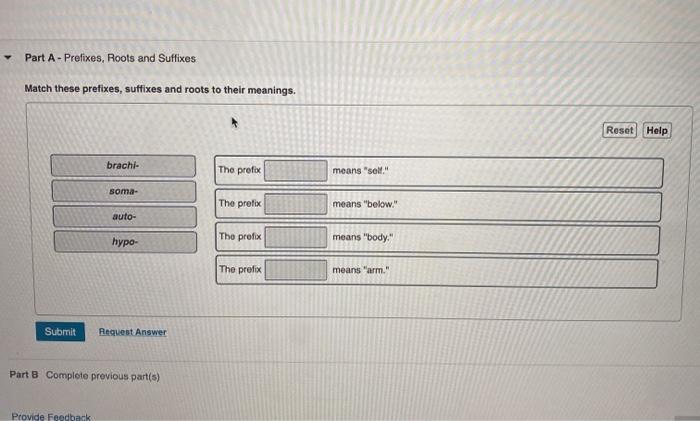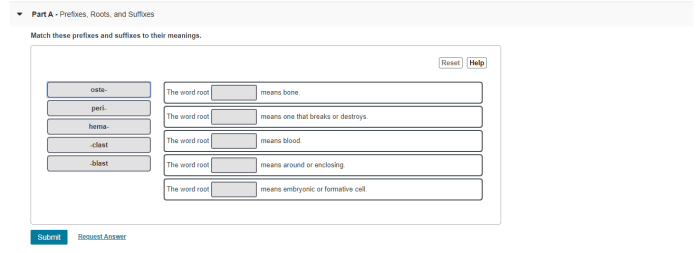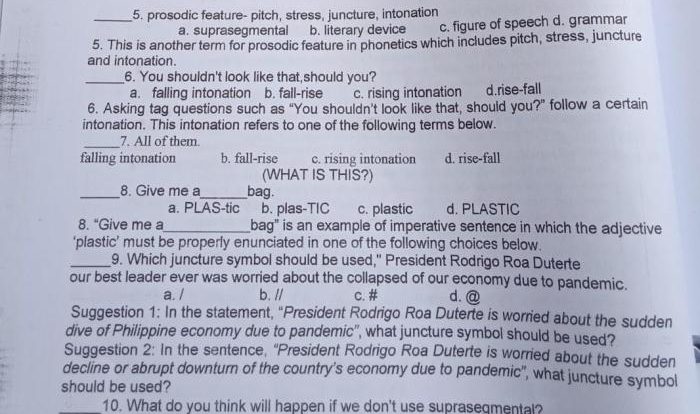Match these prefixes suffixes and roots to their meanings – Embarking on a linguistic journey, we delve into the fascinating realm of prefixes, suffixes, and roots. These linguistic building blocks hold the key to unlocking the etymological secrets of words, empowering us to decipher their origins and expand our vocabulary.
Unveiling the intricacies of prefixes, we explore their ability to modify word meanings, setting the stage for a deeper understanding of word formation. Delving into the world of suffixes, we unravel their power to alter word classes, transforming nouns into verbs and adjectives into adverbs.
Matching Prefixes, Suffixes, and Roots: Match These Prefixes Suffixes And Roots To Their Meanings

Matching prefixes, suffixes, and roots to their meanings is a fundamental aspect of language learning and vocabulary enhancement. By understanding the structure and function of these word elements, learners can unlock the complexities of language and gain a deeper appreciation for its nuances.
Prefixes, Match these prefixes suffixes and roots to their meanings
A prefix is a morpheme that is added to the beginning of a word to modify its meaning. Common prefixes include:
-
-*un-
Negation (e.g., unhappy)
-*re-
Again (e.g., rewrite)
-*pre-
Before (e.g., preheat)
Suffixes
A suffix is a morpheme that is added to the end of a word to change its part of speech or meaning. Common suffixes include:
-
-*-ly
Adverb (e.g., quickly)
-*-tion
Noun (e.g., education)
-*-ive
Adjective (e.g., creative)
Roots
A root is a morpheme that carries the core meaning of a word. Common roots include:
-
-*chron
Time (e.g., chronology)
-*geo
Earth (e.g., geography)
-*phil
Love (e.g., philosophy)
Matching Prefixes, Suffixes, and Roots to Their Meanings
Matching prefixes, suffixes, and roots to their meanings involves identifying the specific morpheme and determining its function within the word. For example, in the word “unhappy,” the prefix “un-” negates the meaning of the root “happy.” Similarly, in the word “education,” the suffix “-tion” changes the part of speech of the root “educate” from a verb to a noun.
Applications of Matching Prefixes, Suffixes, and Roots
Matching prefixes, suffixes, and roots has several practical applications:
-
-*Vocabulary Enhancement
Understanding the meanings of prefixes, suffixes, and roots helps learners expand their vocabulary and recognize patterns in word formation.
-*Etymology
Studying prefixes, suffixes, and roots provides insights into the origins and history of words.
-*Language Learning
Matching prefixes, suffixes, and roots is a valuable tool for language learners to improve their comprehension and fluency.
Quick FAQs
What is the significance of matching prefixes, suffixes, and roots?
Matching prefixes, suffixes, and roots provides a systematic approach to understanding word formation and meaning. It enhances vocabulary, facilitates etymology studies, and supports language learning.
How do prefixes impact word meaning?
Prefixes, attached to the beginning of words, modify their meaning. For example, the prefix “un-” in “unhappy” negates the meaning of “happy.”
What is the role of suffixes in language?
Suffixes, added to the end of words, change their grammatical function. For instance, the suffix “-tion” in “education” transforms the noun “educate” into a noun.



